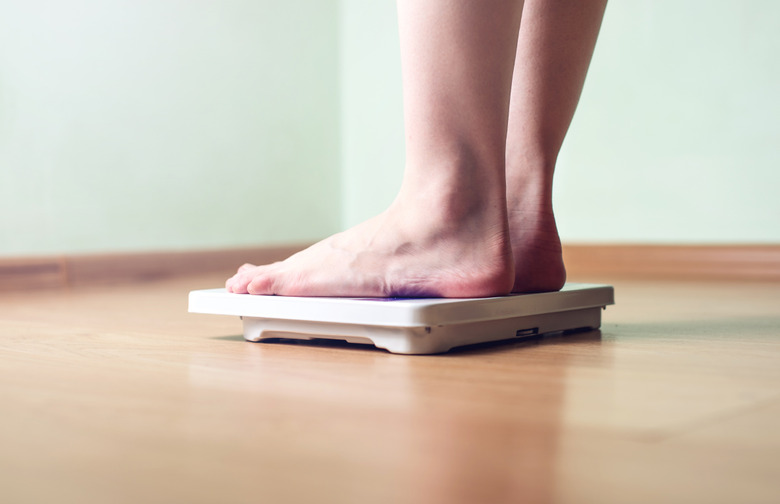Things You Think You Know About Healthy People That Just Aren't True Slideshow
Who are these "healthy people" anyway? Everyone has some idea in their mind of what health looks like. These ideas are often vague, usually involving someone who enjoys eating greens and going jogging. Sometimes they have a dog they take on runs. Maybe they meditate. Perhaps they have an attractive (and equally healthy) child or two that they somehow coerce to eat salads.
We think we know how health looks on the outside, how it feels, and the lifestyles of those who have it. Though the definition varies from person to person, all of our ideas about healthy people often have one thing in common: They aren't us.
We tend to spend a lot of time criticizing ourselves. We eat a doughnut and think, "Wow, I really need to eat healthier..." We skip the gym and think, "Someone in better shape would be there right now." Our own self-talk is posed against us, a skewed comparison representing a negative self-opinion that only makes things worse.
With Instagram, magazines, and a deluge of health imagery surrounding us all day, it's become more tempting than ever to condemn our own health in comparison to those elusive "healthy people," who are always somehow just doing better.
But you might be more like the real healthy people out there than you think. Here are some things you think you know about healthy people that just aren't true.
They Never Eat Pizza (or Any Other Processed Foods)
Processed foods aren't great — they have all kinds of additives, ingredients, and weird substitutions that your body would likely rather you avoid. But healthy people don't cut them out. In fact, avoiding processed foods entirely would be almost impossible and, in all honesty, it sounds miserable.
Restaurants use processed ingredients. Snack food choices are sometimes limited. And while there are healthier, unprocessed meals than pizza out there, sometimes that's just not what you end up wanting to eat. Living a fulfilling, free life involves putting yourself in situations where processed foods are a must; avoiding those situations for the sake of your diet is the opposite of healthy, and the real healthy people out there know that.
They Don’t Drink
Did you know that people who exercise more also tend to drink more? Drinking isn't terrible for you, as long as it's done mindfully and with moderation. One glass of wine a day could have a ton of health benefits, as could some more party-friendly drinks like tequila.
When drinking cocktails, the healthful way to go about it is to be mindful of the sugar and other ingredients you're ingesting. But one drink won't kill you, and it could open up social situations and connections that are healthier for you in the long run than avoiding the simple syrup and just staying home.
They Go to the Gym Every Day
There's no doubt that movement is important for keeping yourself healthy. It boosts energy, improves mood, and aids circulation — all of which are crucial aspects of health.
But not every person's exercise regimen is the same. Every person enjoys different types of movement — and as with food, the only exercise plan that works is the one you enjoy. So no two people will work out the same.
Additionally, no two days are the same. We aren't robots. Sometimes, bodies get tired. Sometimes they're sore. The fluctuations of day-to-day life affect your muscles and energy; when you work out while you're tired or worn out, you're not going to reap the benefits. You're only going to wear yourself out. Healthy people don't try to push through these feelings; they pay attention to these feelings. When they're tired, they don't go to the gym. When they're sore, they stretch instead. There's nothing healthy about overdoing it.
They Don’t Eat a Lot of Fat
Low-fat diets are so '90s — and here's to hoping they stay there. Fats are crucial for brain health and for all kinds of other bodily processes. So when your body doesn't have any, it's going to struggle — and get hungry fast. Fats of all kinds (yes, even the saturated ones) are important. They keep down cholesterol and increase satiation — not to mention they make your food taste really freaking good.
They All Have Similar Body Types
This is a misconception that shows up in every piece of media we see. When's the last time you saw a stock photo of a larger-bodied person running? What about a chubby-cheeked perfume ad? Those varied representations of healthy people are far and few in between, reflective of a societal misunderstanding that thin or small equates to healthy. Not too thin, of course — but an ideal in between where health and weight align.
This understanding is flawed, and has caused more problems than it's worth. Body size has never been a proven indicator of health — hence, those thin people you know who constantly eat junk food with abandon or that husky friend who's fastidiously health-conscious. Healthy people come in all shapes and sizes, regardless of how corny that sounds.
They’re Super-Productive
No human being can be on 100 percent of the time. Even the healthiest, most balanced people need a break — and they know that self-care is half the battle when it comes to health. Taking time to rest, recuperate, and just plain old do nothing can actually make you more productive in the long run (and way healthier). Stress hormones accumulate when you don't take time off from work and chores; these hormones can mess with your health and leave you feeling awful.
They’re Probably Gluten-Free, Vegan, or Some Other Thing
Healthy doesn't have to have a name. To live a healthy lifestyle, you don't have to subscribe to one of the health trends of the modern day. Gluten-free, paleo, vegan, and other dietary guidelines aren't necessary for staying healthy. Think about it: These diets haven't been around for very long. Was everyone unhealthy before they were invented? Absolutely not.
Their Income Doesn’t Affect Their Health
Multiple studies have repeatedly shown that lower income is associated with disease, hospitalization, and mortality. The reasons behind these disparities are still being argued; but for some, health is simply not an accessible option. It's an unfortunate reality of life, but higher-income individuals are overall healthier.
They Just Don’t Eat as Much
There's this ubiquitous unspoken belief that healthy people just don't need to eat as much to feel full. They can eat a salad, half a sandwich, or an apple for lunch (instead of the more reasonable choice of eating all three) and feel satiated. They're healthier than me, someone might despondently think, gazing sorrowfully at their empty plate beside another's half-full one. But this is totally wrong.
Every person's needs are different; but what makes a person healthy is just listening to them. For a lot of healthy people (especially active ones), that means consuming a lot of food, and enjoying it. When you let yourself go hungry, your metabolism fluctuates like crazy. That fluctuation creates blood sugar highs and crashes that leave you feeling exhausted and your body feeling confused. If that's what healthy feels like, it's not something we should want to be.
They Never Go Out to Eat
Miraculously, social relationships can make or break your physical health — here's how.
Research shows that friendships and social interaction can lower blood pressure, heart rate, and cholesterol levels significantly. Additionally, you can sleep better, reduce risk of disease, and increase your overall energy levels due to the mitigation of the stress hormone cortisol — all by hanging out with some friends. People have been bonding over food since the beginning of time, and in modernity we do this by going out to eat. Healthy people work on fostering close, meaningful relationships — and that is much harder to do without stepping foot in a restaurant.
They Prioritize Food
The truly healthiest, most balanced people know that food isn't everything. Your body is a vessel — it's there to help you experience life. But it isn't the reason for life, or the only important part of it. Relationships, experiences, and mental health are where we derive a huge amount of value.
It's important to treat your body with care, since it carries you through those other important things. But as soon as food and health get in the way of living the most fulfilling parts of life, healthy people know it's okay to take a break from healthy habits. Food isn't the priority — happiness is.
They Successfully Curb Their Cravings
"Curbing" cravings is a total myth. When you say no to something you crave, you're psychologically predisposed to want it more. You've probably experienced this firsthand, whether you were fighting a sugar craving, trying to avoid your side of French fries, or something else.
The healthiest sustainable eating habits involve flexibility and eating treats. Instead of curbing that craving, healthy people just eat the thing they want. After they eat it, they feel satisfied and move on — something you can't do if you're constantly trying to deny your craving.
They Never Eat When They’re Not Hungry
Mindful, intuitive eating involves listening to your hunger signals and making food decisions based on them. The practice has been popularized as the perfect pathway to healthy eating. And in many ways, it is. However, the simple task of "eating when you're hungry, stopping when you're full" is easier said than done. There are many reasons and motivations for eating that don't have anything to do with hunger. For instance:
- Food tastes really good.
- It's a friend's birthday.
- You're craving salt.
- Everybody else is eating.
All of these are perfectly valid and don't have to be ignored. Strictly eating only when you're hungry and stopping immediately after you experience fullness doesn't leave a lot of room for the unexpected conditions of daily life. Are you going to skip dinner with a friend because you're not hungry? Are you going to pass on your own birthday dessert after dinner? Neither of those choices would be considered healthy at all.
They Succeed at Weight Loss Diets
Alternatively, healthy people (by definition) don't diet. Diets put your brain into a deprivation mindset, reminding itself of all the things it can't have. Then, it makes you crave all those things — simply because you can't have them. It's psychology. That constant cycle of craving and depriving isn't healthy, and people who sustain lasting health habits don't bother. Instead, they stay tuned in to their bodies and know that their weight will fluctuate with time. Sometimes, they eat more treats and sometimes they eat less.
They Try to Cut Calories
Some of the healthiest foods around are high in calories. That's nothing to worry about — which doesn't stop publications (The Daily Meal is guilty of this as well) from running scary-sounding articles like "These Healthy Foods Have More Calories Than a Big Mac!" and "Your Smoothie Bowl Has HOW Many Calories?!" Obviously, peanut butter and smoothie bowls are incredibly healthy foods (that just so happen to taste even better together). Calories come from nutrients. Nutritious foods are often high-calorie foods.
So how do you eat healthily without worrying about calories?
Take a tip from the healthy people out there — focus on the nutrition in your food. Search for vitamins, scour the shelves for protein, and seek out quality of food over quantity of calories.
They All Love Smoothies
Some healthy people like smoothies, some don't. There are way more healthy breakfasts out there that don't necessitate going anywhere near a blender; so if you're trying to be healthy, there's no need to begrudgingly sip one. Try one of these meals to start your day instead.
















